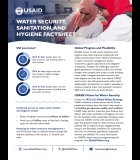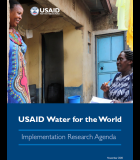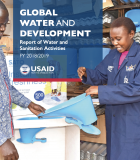World Water Day 2019: Leaving No One Behind

World Water Day is observed annually on March 22 to raise awareness about the vital importance of water to everything from public health and youth education to economic development and gender equality. The theme for World Water Day 2019, "Leaving No One Behind," is based on a core pledge of the 2030 Agenda for Sustainable Development—that everyone must benefit from progress.
Increasing sustainable access to safe drinking water is a key objective of the U.S Government Global Water Strategy and USAID’s Water and Development Plan. In support of the water strategy, USAID seeks to provide 15 million people with sustainable access to drinking water services by 2022.
Globally, 663 million people still lack access to safe drinking water sources—the very resource on which a healthy, productive life depends. Even for those who have access, services are often inadequate to meet basic needs. Across sub-Saharan Africa, 30 percent to 50 percent of rural systems are nonfunctional within five years of being built, and utilities in urban areas often ration water servicing. Similarly, water is often contaminated from urban, industrial, and agricultural pollutants that can compromise nonpiped water systems, even those that are classified as improved water sources. Many of those who lack access to basic water services also live in conflict-affected states with poor governance, insecure tenure, high rates of poverty, and weak institutions. In countries with a history of conflict and civil unrest, the impact of refugees has further deteriorated the condition of water supply services.
USAID’s Approach
The Agency helps partner countries reach the poor and assist the underserved in gaining first-time or improved access to basic drinking water services and climb progressively toward safely managed services. Access to a safe and reliable drinking water source is critical for health and livelihoods, and is especially important for unlocking educational and economic opportunities for women and girls. The reliable provision and management of drinking water also builds trust in local and national governments, and can contribute to local and national stability. Increasing access levels in rural areas has been a traditional focus of USAID investments. While investments in rural water supply will continue, the rapid pace of urbanization also requires increasing attention to urban services and utilities, particularly in dense peri-urban settlements and secondary cities and towns, often served by informal providers. Examples of USAID’s water assistance include:
- Increasing the number of people with access to basic drinking water services
- Improving the ability of education and health facilities to provide and manage water services adequately in schools and clinics
- Catalyzing increased financing for the operations and maintenance of water systems, including through investing in innovative financial vehicles
- Improving the quality and reliability of drinking water
- Increasing the number of people with access to safely managed drinking water services
As a result of USAID programs, communities around the world are benefiting from access to improved water and sanitation services, and promotion of key hygiene behaviors.





